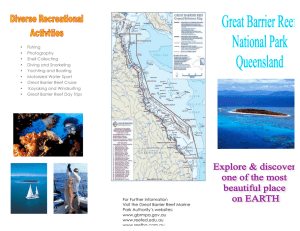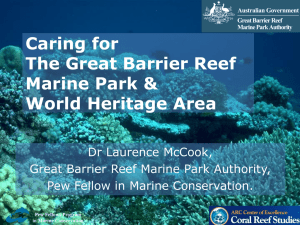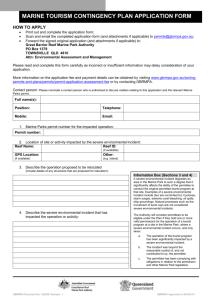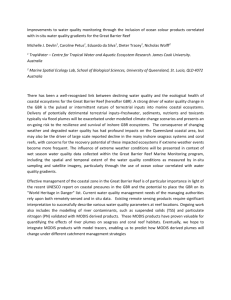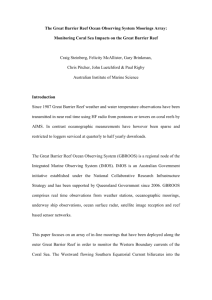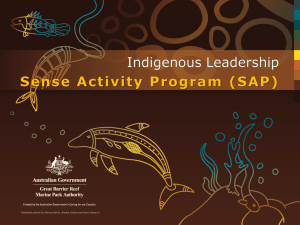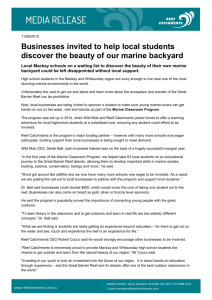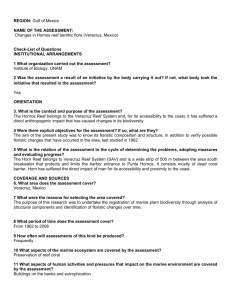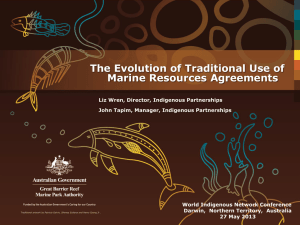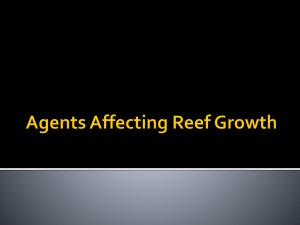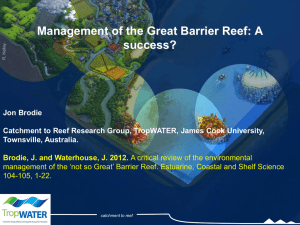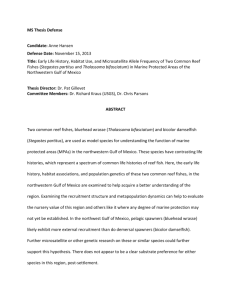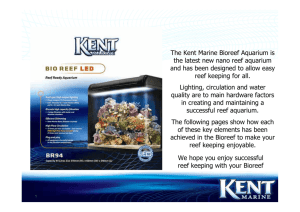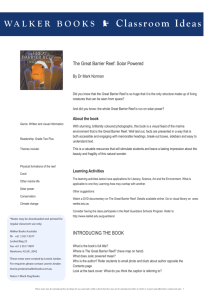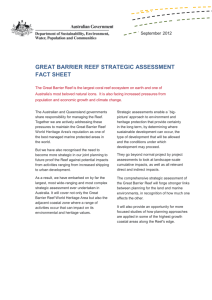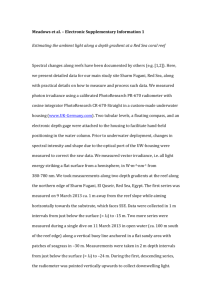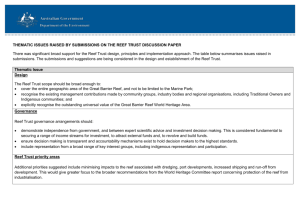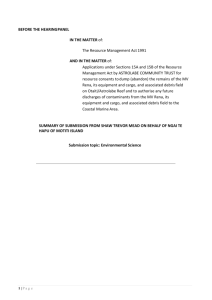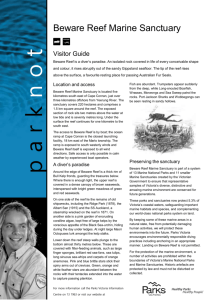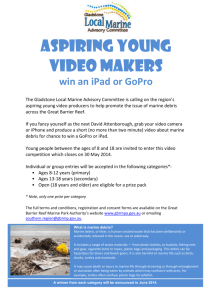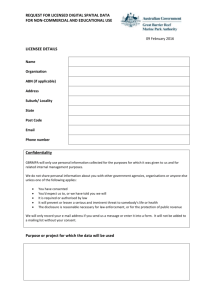17:15 Gooch M
advertisement
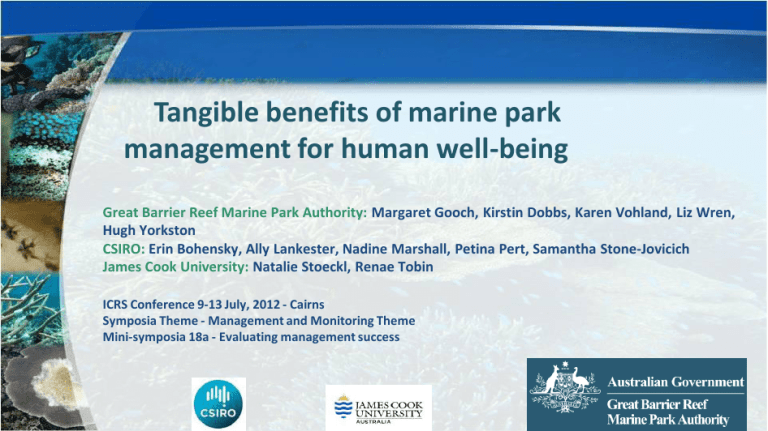
Tangible benefits of marine park management for human well-being Great Barrier Reef Marine Park Authority: Margaret Gooch, Kirstin Dobbs, Karen Vohland, Liz Wren, Hugh Yorkston CSIRO: Erin Bohensky, Ally Lankester, Nadine Marshall, Petina Pert, Samantha Stone-Jovicich James Cook University: Natalie Stoeckl, Renae Tobin ICRS Conference 9-13 July, 2012 - Cairns Symposia Theme - Management and Monitoring Theme Mini-symposia 18a - Evaluating management success Uses of the Reef Outlook Report Benefits of use ACTIVITY/USE BENEFITS Marine tourism presentation, management, economic value. Defence training & operations of Australia's defence services recreation, seafood, economic value service coastal Queensland industries & communities high levels of visitor satisfaction Fishing Ports and shipping Recreation (excluding fishing) Great Barrier Reef Marine Park Authority (2009). Outlook Report 2009. http://www.gbrmpa.gov.au/outlook-for-thereef/great-barrier-reef-outlook-report page 84 Scientific research best available information for management Traditional Use of Marine Resources provides environmental, social, economic & cultural benefits to TOs and sea country Outlook Report Key Questions What are the current state and trends of the Great Barrier Reef's environmental, economic, social & cultural values? What is affecting the Great Barrier Reef's environmental, economic, social & cultural values? How have management activities made a difference? Great Barrier Reef Marine Park Authority (2009). Outlook Report 2009. http://www.gbrmpa.gov.au/outlook-for-thereef/great-barrier-reef-outlook-report page 84 GBRMPA management tools & approaches Legislation, plans, permits, policy, procedures Tools Approach Education, planning, EIA, monitoring, stewardship, enforcement, partnerships Present the GBR Regulate access Mitigate impacts – cc Social science * Identify changes in demographics, coastal activities, and people's values & perceptions of issues * Respond to community perceptions & concerns * Keep a 'finger on the pulse' of Reef-dependent communities & industries * Assess trade-offs between competing objectives * Highlight the importance of non-market ‘values’ * Identify opportunities & benefits for human wellbeing and Reef resilience Social science Further, the social science program contributes to a variety of initiatives within GBRMPA including: * Partnerships with key stakeholders and Reef users * Capacity-building of Reef-dependent individuals and industries in the face of change eg extreme weather events Relies on a range of researchers to deliver timely data FOCUS: Extreme weather & 2 NERP Projects Extreme weather Cyclone Yasi & Flood Plume Impacts on community & Reefdependent industries? (Marine tourism & commercial fishing) * telephone surveys * interviews * two workshops Extreme weather Natural systems site access, scenic quality, biodiversity Personal circumstances Health, personal safety, outmigration, security Local communities Networks, support, wellbeing Infrastructure Road, rail, telecoms, airports, jetties, ports, sewage Business Staff recruitment & retention , $ damage to assets, loss of income Impacts on community & Reef-dependent industries? Two Social Science Reports 1. Marshall & Tobin 2. Moon & Gooch NERP 10.2: Socio-economic systems & reef resilience (Prof Natalie Stoeckl) Objectives 1. Improve understanding of what residents and tourists do in the GBR and think is important about the GBR – e.g. fishing, boating, snorkeling, or reef-based jobs – COMPARED to things such as mining jobs 2. Determine whether residents or tourists are concerned about impacts & think it is worth ‘paying’ to protect the GBRWHA 3. Assess extent to which healthy marine environments contribute to * Overall life-satisfaction (well-being) of residents * Overall satisfaction of tourists with their stay in the region 4. Assess impacts of deterioration in e.g. live coral cover, water clarity, fish abundance might have on * Overall life satisfaction of residents; and * Length of tourist stay 5. Determine extent to which market prices may be able to influence water quality in the GBR lagoon NERP 10.1: SELTMP (Dr Nadine Marshall) Long term monitoring …how do people use & benefit from the GBR? Top down (MEA) – tight linkages between environmental & human conditions Bottom up *10 working groups *SSAP *Steering committee *Who? What? Where? When? Why? How? *What data already exists? *What data is relevant? *Where are the gaps? SSAP Industry, GBRF, Researchers, Govt, TOs Steering Committee Advisor Output Shipping TOs External Processes Catchment Industry Drivers of change Comm Fish & Aquacult Human stories economics Working Groups: Technical Advisory Component Marine Tourism Coastal Community Recreation Strategic Advisory Component Conclusion Tangible benefits of management are constrained by particular ecological, economic, social and cultural conditions * need to be monitored over time Variables selected for long-term monitoring should provide reliable, relevant information which: * measure interactions between sub-systems (social, cultural, economic & ecological) * are clearly associated with the GBRMPA's goal of promoting Reef resilience Questions? Thanks! Margaret Gooch, Erin Bohensky, Kirstin Dobbs, Ally Lankester, Nadine Marshall, Petina Pert, Samantha Stone-Jovicich, Natalie Stoeckl, Renae Tobin, Karen Vohland, Liz Wren, Hugh Yorkston
